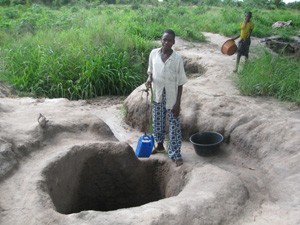
BEFORE: In Mopeia district, water was taken from rivers and unprotected wells, increasing the risk of cholera and other water-borne diseases. More than three-quarters of the community lacked access to latrines or landfills.
AFTER: A capped well with a pump provides clean water to district residents. Rosita no longer walks great distances, and enjoys better health and the many amenities access provides. Community members contribute $0.20 per month for maintenance, and spread messages about improved hygiene and sanitation.
Rural areas of Mozambique suffer from poor access to life's most fundamental resource: clean water. USAID has developed a comprehensive approach to increasing rural access to clean water while building capacity of locals to maintain wells into the future.
Life changed dramatically for Rosita, age 32 and mother of four, when USAID's clean water program was implemented in her district. She recalls, "Before, I had a lot of suffering to collect water. I had to walk far to look for water to cook for my family, and we couldn't bathe at home. Our community had no latrines, and our water was not treated. Many people got sick with cholera, diarrhea, malaria and other diseases."
Since September 2010, USAID has established 22 wells that serve over 11,000 people. In addition, USAID has trained community members to maintain and rehabilitate the pumps.
This project, says Rosita, "made a big impact on our lives and taught us great things. This project brought happiness to many families."







Comment
Make a general inquiry or suggest an improvement.